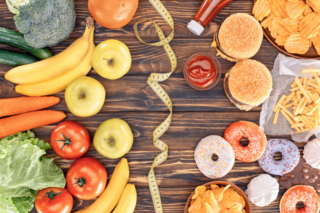Stress
Tired of Emotional Overeating? 4 Tips to Kick the Habit
Learn to manage difficult emotions and love your food.
Posted October 31, 2018

Eating is one of life's most enjoyable experiences. And yet many of us have a fraught relationship with food, eating for emotional comfort but then feeling guilty about overindulging.
I recently spoke with Arlene B. Englander, a therapist and author who specializes in helping people overcome emotional overeating. We focused on her new book, Let Go of Emotional Overeating and Love Your Food. Arlene shared many useful takeaways for those of us who at times deal with emotional overeating (myself included). Four main points stood out to me that can help us retrain our eating habits.
1. Manage Your Stress.
When we arrive at the table feeling stressed out and anxious, there's a high probability that we'll fall into unhealthy eating patterns. Arlene provides techniques in her book for releasing unnecessary tension when we sit down for a meal; it's also important to address our stress levels in the rest of our lives, as Arlene explained:
Arlene B. Englander: Many people who experience emotional overeating are not handling stress effectively away from the table. So they aren't free to sit down and really be there in the moment and enjoy their food when they eat.
Seth J. Gillihan: What are some things we can do when we're hurting emotionally, rather than expecting food to solve things?
ABE: It really can be any activity that's truly enjoyable and that really engages us, getting us in the flow—a hobby, productive work, pleasurable and fun exercise, getting together with friends. When we can handle stress effectively away from the table, we're free to enjoy so many of life's experiences—including food.
Arlene also emphasized the importance of recognizing and tending to our thoughts as a way to address emotional overeating:
ABE: One of my favorite tools for managing stress is cognitive behavioral therapy. We can be aware of our thoughts and the cruel things we may be saying to ourselves that are causing us pain. That awareness is so central to any behavioral change because if we're aware that we're speaking to ourselves in a way that's unkind, we can then create a voice within ourselves that's both logical and compassionate. A nurturing voice, like an ideal friend or parent, or an ideal self, is a wonderful way to self-soothe—wherever and whenever, without food.
2. Savor Your Food.
When we eat compulsively in an attempt to manage our emotions, we don't enjoy our food, especially if we're feeling guilty about eating. We'll also tend to eat quickly, barely registering the sensations as we focus on consuming as much as we can. One of the antidotes to these habits is deliberately slowing down and appreciating our food.
ABE: We can really be there in the moment as we eat. We can savor the experience of our food, our surroundings, even the experience of being ourselves in that moment. When we eat this way, we can slowly get to the point of satisfaction, and be aware of that moment, at which point we stop. This is a skill that can be learned, that's very enjoyable, and that pulls in all of our senses—our taste, our touch, our sense of smell—and allows for much more enjoyment than we've ever experienced. It's really a very pleasurable lifelong habit once we've developed it.
Arlene offered some examples of how this approach to food differs from more mindless eating.

If I want chocolate, I'll savor one piece of Godiva chocolate for 10 minutes, if I sit and notice every aspect of it, as opposed to downing a whole Hershey's bar as I walk down the streets of Manhattan. Or I'll have three small chocolate chip cookies and a glass of milk, as opposed to standing by the fridge and gobbling down a whole box because I was upset.
3. Fill Your Life With Joy.
Throughout our discussion it was clear that emotional overeating is not just about what happens during mealtime; instead, it's related more broadly to the way our lives are structured.
SJG: Why is it important that our lives are as rich as possible when it comes to letting go of emotional overeating?
ABE: If we don't have enough pleasure and joy in our lives, then food takes center stage in a disproportionate way. So making our lives full and enjoyable actually has synergistic benefits in terms of also allowing food to fall into place in an appropriate way. If we're eating to manage unresolved psychological issues, no amount of food will be enough to make us feel better. Unfortunately, if we also are espousing the dieting mentality, we might feel bad about ourselves, and then eat something we feel like we shouldn't be eating or eating too much, and then feeling down on ourselves even more. And this becomes a rapid downward cycle that is so self-destructive. So we want to make our lives as pleasurable and productive as possible away from the table so that food is just one of the many pleasures on our plate of life, so to speak. Then we're free to enjoy and love our food to the utmost because we're really there, in the moment, when we're eating.
4. Notice Your Reactions to Ending a Meal.
Arlene described the trouble many of us have as we sense the end of a meal coming, which can bring up some powerful emotions:
ABE: It can vary from person to person, but the reactions can be very strong. Often they beckon us back to the individual's childhood. For example, they could have a feeling of guilt because they haven't eaten everything on the plate, and their parents might have been Depression-era individuals who told them "there are starving children in China" as a way to get them to clean their plate. And very often there's a feeling of sadness, almost a sense of mourning, for the fact that the pleasure and the comfort of the meal have passed. Sometimes I see this in people whose parents were very hardworking, and were only around for mealtimes or only around on Sunday for a special meal. And there's truly sometimes a sense of grieving.
While ending a meal can be difficult, it also presents opportunities:
ABE: When we open ourselves up to an awareness of what we're experiencing in that moment at the end of a meal, there's so much to be gained. If we feel sad we can ask ourselves, What can I do to put more comfort in my life? Can I reach out more to others and feel more of that closeness that I crave? Or I can set an intention to have more pleasure in my life, so that the meal is really in some ways just a first course to all the enjoyment I'm going to have during the day. Or if I'm heading back to work I can ask myself, Have I found ways of making my work feel more meaningful and enjoyable and connecting to those around me? So this kind of awareness of how we feel at the end of a meal can help us to make our lives more full and more enjoyable and more productive.
This approach may be especially important at night, when many of us are most at risk for emotional overeating:
SJG: You describe that feeling of loss might be especially strong when it's the end of the day, and it can be so hard not to overeat at night. Why is that? Why is it so hard to stop eating at the end of the day?
ABE: For many of us, the evening is a lengthy period of unstructured time. After dinner many people are asking themselves, What am I going to do for the rest of the night? So we need to ask ourselves, What can I do during the evening that will be either productive or enjoyable? Then there's less of a chance that I'm going to be wandering to the fridge and grazing. For some people that might mean having not just a "good" book but a great book, something they can't wait to dive back into. So it's really enhancing the quality of our experience in the evening. It might be getting out of the house altogether, like taking an adult education course or dance class with your partner, or anything else. But it's doing something that pleasurable or productive or both, during that time of the day rather than just having a lot of unstructured time. And for some of us, it's just too much time.
One way to reduce the amount of unstructured time in the evening is to shift our bedtime to an earlier schedule, which admittedly can be tricky for people whose internal clock is set to "Night Owl."
ABE: When you have a long period of time—say, from 6:00 PM to 1:00 AM—when all you're doing is sort of wandering around with a lot of screens and unstructured time, and perhaps some unresolved stress, it's a perfect storm for emotional overeating. So it can be a good idea to shift our biorhythms so we're going to bed earlier, and then we can get up earlier in the morning. Morning is also a great time to exercise, because later in the day people tend to structure your day for you with meetings and other things. If you're up early in the morning, you exercise, and then you have a relatively early dinner and go to bed at a decent hour, you've really set yourself up for success.
With practice, we can learn how to eat in a way that's guilt-free and truly satisfying:
ABE: As our hunger diminishes and our fullness slowly advances, we can leave a meal just at the point of satisfaction. It's a very positive emotional connection to our food, and a strength-oriented approach. As we learn to really be there in the moment and savor what we eat, it's amazing the wide world of delicious and healthy and highly nutritious foods that we learn to really enjoy, all the fruits and vegetables and wonderful choices that are opened up to us. And when we honor our food it's another way of honoring ourselves.
The full interview with Arlene can be found here.
References
Englander, A. B. (2018). Let Go of Emotional Overeating and Love Your Food: A Five-Point Plan for Success. Lanham, MA: Rowman & Littlefield.




